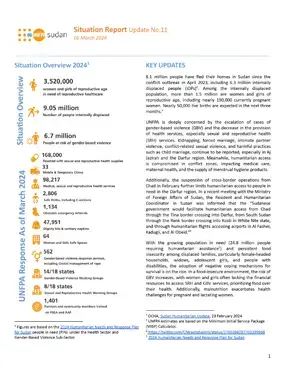KEY UPDATES
8.1 million people have fled their homes in Sudan since the conflict outbreak in April 2023, including 6.3 million internally displaced people (IDPs)2. Among the internally displaced population, more than 1.5 million are women and girls of reproductive age, including nearly 150,000 currently pregnant women. Nearly 50,000 live births are expected in the next three months.3
UNFPA is deeply concerned by the escalation of cases of gender-based violence (GBV) and the decrease in the provision of health services, especially sexual and reproductive health (SRH) services. Kidnapping, forced marriage, intimate partner violence, conflict-related sexual violence, and harmful practices such as child marriage, continue to be reported, especially in Aj Jazirah and the Darfur region. Meanwhile, humanitarian access is compromised in conflict zones, impacting medical care, maternal health, and the supply of menstrual hygiene products.
Additionally, the suspension of cross-border operations from Chad in February further limits humanitarian access to people in need in the Darfur region. In a recent meeting with the Ministry of Foreign Affairs of Sudan, the Resident and Humanitarian Coordinator in Sudan was informed that the “Sudanese government would facilitate humanitarian access from Chad through the Tina border crossing into Darfur, from South Sudan through the Renk border crossing into Kosti in White Nile state, and through humanitarian flights accessing airports in Al Fasher,
Kadugli, and Al Obeid.”4
With the growing population in need (24.8 million people requiring humanitarian assistance5) and persistent food insecurity among displaced families, particularly female-headed households, widows, adolescent girls, and people with disabilities, the adoption of negative coping mechanisms for survival is on the rise. In a food-insecure environment, the risk of GBV increases, with women and girls often lacking the financial resources to access SRH and GBV services, prioritizing food over their health. Additionally, malnutrition exacerbates health challenges for pregnant and lactating women.


